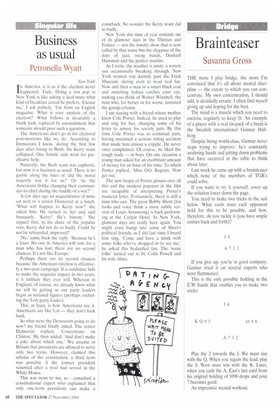Singular life
Business as usual
Petronella Wyatt
New York I n America, it is as if the election never happened. Truly. Doing a vox pop in New York is like asking a deaf-mute what kind of breakfast cereal he prefers. 'Excuse me,' I ask politely. 'I'm from an English magazine. What is your analysis of the election?' What follows is invariably a blank look, replaced by astonishment that someone should pose such a question.
The Americans don't go in for electoral post-mortems like we do. According to Democrats I know, during the first few days after losing to Bush, the Kerry team collapsed. One female aide went for psychiatric help.
Naturally, the Bush team was euphoric, but now it is business as usual. There is no garble along the lines of 'did the moral majority win it for us?' Or 'do the Americans dislike changing their commander-in-chief during the middle of a war?'
A few days ago an acquaintance of mine sat next to a senior Democrat at a lunch. 'What will happen to Kerry now?' she asked him. He turned to her and said brusquely, 'Kerry? He's history.' She argued that, in his share of the popular vote, Kerry did not do so badly. Could he not be rebranded, improved?
'No,' came back the reply. 'Because he's a loser. No one in America will vote for a man who has lost; there are no second chances. It's not like Europe.'
Perhaps there are no second chances because the American election is effectively a two-year campaign. If a candidate fails to make the requisite impact in two years, it is unlikely they ever will. Whereas in England, of course, we already know what we will be getting as our party leaders begin as national figures (perhaps excluding the Tory party leader).
This, at least, is how Americans see it. Americans are like Lot — they don't look back.
So what were the Democrats going to do now? my friend finally asked. The senior Democrat replied, 'Concentrate on Clinton.' He then added, 'And don't make a joke about which one.' We assume in Britain that presidents are allowed to serve only two terms. However, claimed this scholar of the constitution, a third term was possible if the former president returned after a rival had served in the White House.
This was news to me, so consulted a constitutional expert who explained that only one-term presidents can make a comeback. No wonder the Kerry team did so badly.
New York this time of year reminds me of its glamour days in the Thirties and Forties — not the tawdry show that is now called by that name but the elegance of the days of jazz, swing bands, Dashiell Hammett and the perfect martini.
As I write, the weather is misty, a watery sun occasionally breaking through. New York women trip daintily past the Frick Museum, daring even to wear real fur. Now and then a man in a smart black coat and matching fedora catches your eye, making you think of Walter Winchell, the man who, for better or for worse, invented the gossip column.
I am staying with a friend whose mother knew Cole Porter. Indeed, he used to play and sing for her, changing some of his lyrics to amuse his society pals. By this time Cole Porter was in continual pain, having sustained a serious riding accident that made him almost a cripple. He never once complained. Of course, he liked the rough trade — in boys. On one occasion a young man asked for an exorbitant amount of money for an hour of his time. To which Porter replied, 'Miss Otis Regrets. Now get out.'
The new biopic of Porter glosses over all this and the modern popstars in the film are incapable of interpreting Porter's nuanced lyrics. Fortunately, there is still a man who can. The great Bobby Short (for looks and voice think a more subtle version of Louis Armstrong) is back performing at the Carlyle Hotel. In New York, glamour days are really here again. You might even bump into some of Short's political friends, as I did last time I heard him sing. 'Come and have a drink with some folks who've dropped in to see me,' he asked this bedazzled fan. The 'some folks' turned out to be Colin Powell and his wife Alma.


















































































 Previous page
Previous page